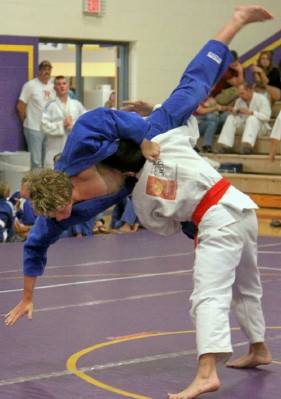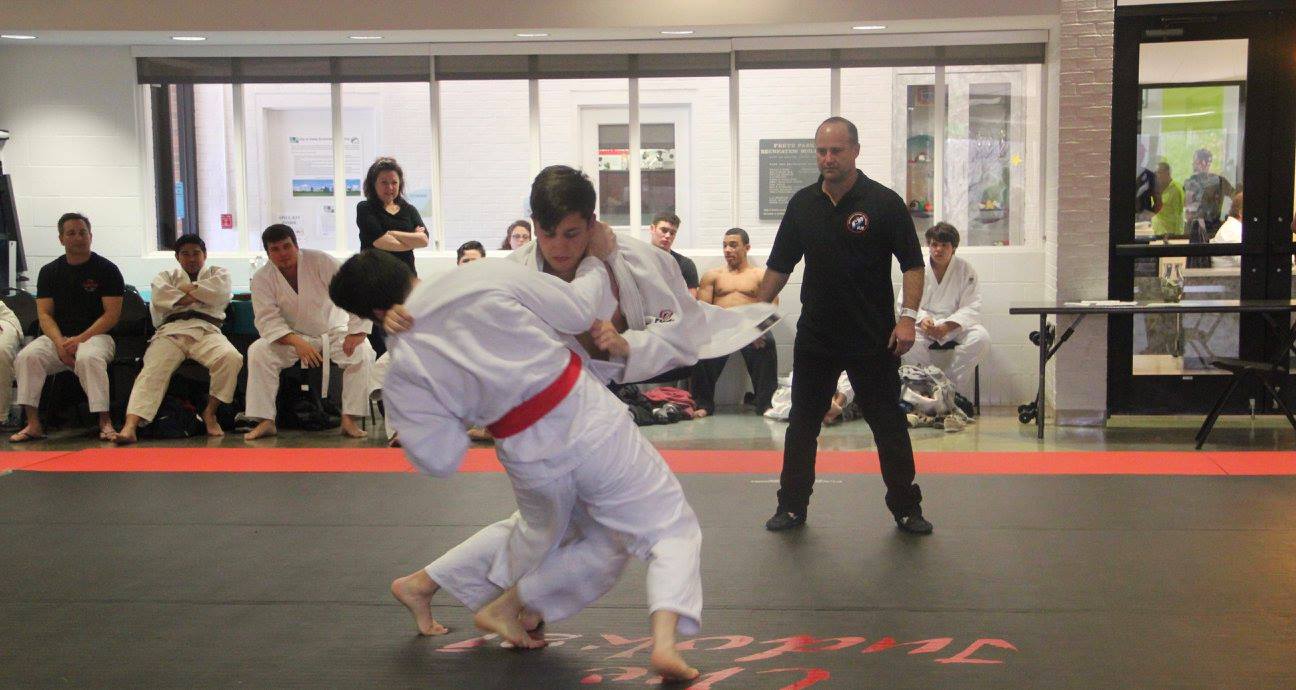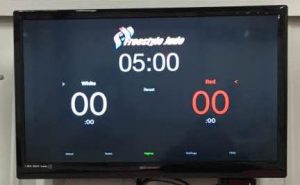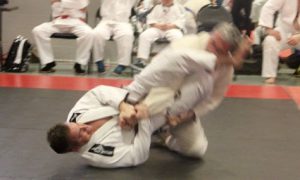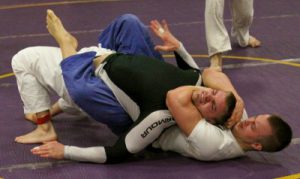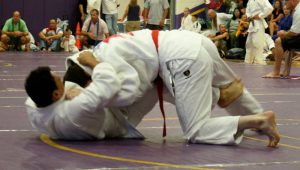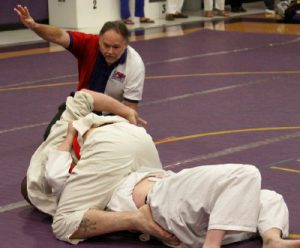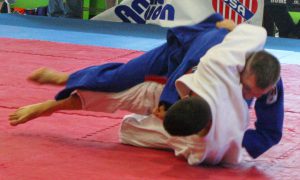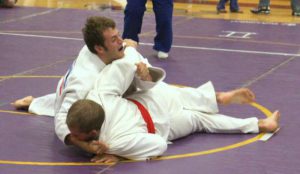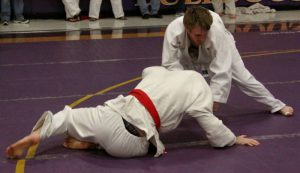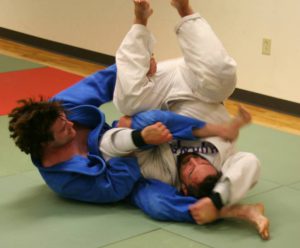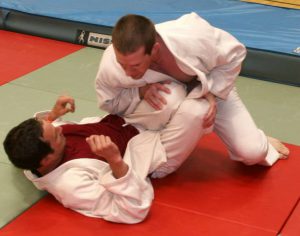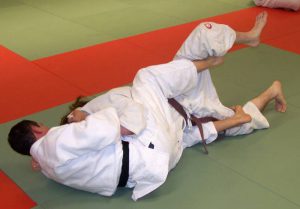In Freestyle Judo, numerical scores are used instead of Waza-ari and Yuko. The Ippon is retained, but a feature you won’t see at any judo tournament other than a Freestyle Judo tournament is the numerical scoreboard as shown here.
|
|
A Freestyle Judo match can end by
Ippon – One athlete throws his opponent for Ippon or wins by an armlock or strangle. Superior Decision – 12 points spread in the score-example; one athlete has 14 points and his opponent has 2 points Decision – One contestant has more points than his opponent at the end of match time. Overtime – First athlete to score wins, but there is no score, the overtime will be judged by the referee and judges. |
Ippon
|
Ippon (Throw)The match ends with an Ippon throw by one contestant. There are several important criteria that must be met for an Ippon to be scored. They are; (1) Control…the thrower must have control of his opponent as he throws him. (2) Force…the throw must be performed with force. No soft or “rolling” Ippons are scored in Freestyle Judo matches. (3) Largely on the back or back side…the athlete being thrown must land primarily on his or her back or back side. |
4 Points
|
4 Points (Throw)If an athlete throws his opponent, but the throw is missing one or more elements of an Ippon, the referee will award 4 points. Generally, a 4-point throw is similar in nature, if not exactly, like a Waza-ari.
4 Points (Hold-down)If one athlete holds his opponent with an Osaekomi Waza for 20 seconds, the referee will signal 4 points for the pinner and instruct him to attempt to apply a submisison technique by saying “4 points (referee designates color of belt), go for your submission.”
|
2 Points |
2 Points (Throw)If an athlete throws his opponent, but less than for a 4-point score, the referee will award 2 points. Generally, a 2-point throw is similar in nature, if not exactly, like a Yuko.
2 Points (Hold-down)If one athlete holds his opponent with an Osaekomi Waza for 10 seconds to less than 20 seconds, the referee will award 2 points. |
1 Point
|
1 Point (Throw)If an athlete throws his opponent, but the opponent lands primarily on his buttocks or front side (the opponent must land on his torso, body, hips or thigh(s)…landing on elbows adn knees or hands and knees does not score) or if the athlete being thrown lands on his back, side or back side but not with sufficient force to merit 2 points, the referee will award 1 point. Generally, a 1-point throw is similar in nature, if not exactly, like the old Koka.
1 Point (Hold-down)If one athlete holds his opponent with an Oasekomi Waza for 5 seconds to less than 10 seconds, the referee will award 1 point. 1 Point (Breakdown)If an athlete turns his opponent over onto the opponent’s back or mostly on his back, the referee will award 1 point for a Breakdown.
1 Point (Guard Pass)If an athlete getes his body past his opponent’s legs and moves to the opponent’s side or takes control of the opponent’s positon, the referee will award 1 Point for a Guard Pass.
1 Point (Guard Sweep or Rollover)If an athlete rolls or sweeps his opponent over to his back or back side, the referee will award 1 Point for the Guard Sweep.
For clarity and ease of understanding, any form of true Control Change wether it is a Breakdown, Guard Pass, or Guard Sweep merits 1 Point. |
Host Your Own Freestyle Judo Tournament or Scrimmage
The best way to get involved in Freestyle Judo is to have a tournament or scrimmage in your club. We get a lot of requests on how to referee Freestyle Judo. The best way is “jump in and do your best” as said by one judo coach. Sure, you may make some mistakes on the rules at first, but as you hold more scrimmages or club tournaments, your refereeing skills will improve and your athletes will get the benefit of competing under Freestyle Judo rules!
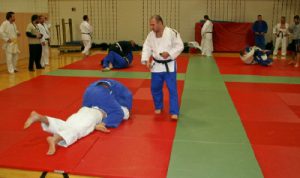 |
Mike Thomas referees at a club scrimmage in the photo. Look at how the mat is set up so that there are 4 small contest areas so that a lot of matches can be held at the same time. | |
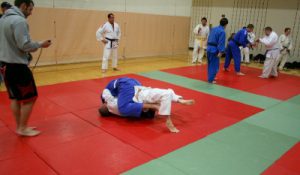 |
Josh Henges (at left, holding the stopwatch) and Derrick Darling (at right) referee. Not only do the athletes get more time on the mat, so do the referees at club scrimmages. | |
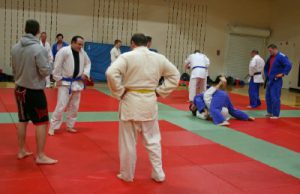 |
Some of the best matches take place in club scrimmages! We encourage every Judo club to hold regular club scrimmages or informal tournaments to develop the skills of your athletes and referees. |
Freestyle Judo – There’s an App for that
|
Finally, a timing and scorekeeping app for “Judo, the way it ought to be.” The Freestyle Judo iOS App provides a complete scoreboard and interval timer solution for Judo/Jiu-Jitsu matches according to International Freestyle Judo Alliance (IFJA) rules. The Freestyle Judo App is designed to be open-ended with the minimalist in mind–just like the Freestyle Judo competition format. Swipe the timer up or down to adjust the match length or scoreboard. Use the context-sensitive buttons to start and stop the Osaekomi timer, award points or signal Ippon. Use the interval timer for high intensity randori workouts. Use the iOS Music App to select a playlist, then turn on the Background Music mode in the Freestyle Judo app to spice up your training. Use AirPlay and an Apple TV to mirror your display on a large screen monitor for a complete scoreboard solution. A complete Freestyle Judo Rules manual is included for reference by Judoka, Coaches, and Referees. When the match is stopped, touch the Freestyle Judo logo for the latest information and videos at www.FreestyleJudo.org. So grab Freestyle Judo from the App Store for your iPhone, iPad, or iPod Touch, and don’t be afraid to grab legs in Judo anymore. The Freestyle Judo app is the official iOS app for the IFJA. |
 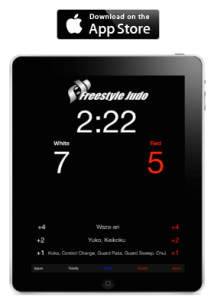 |
